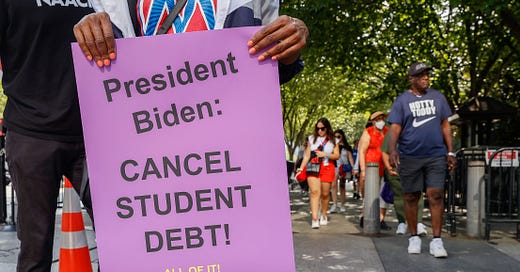Student Debt Cancellation Opponents Are Absolutely Terrified
What lies at the heart of their demands that we all stay suffering is the fear that people will start wanting to look out for each other more.
President Biden finally unveiled his long-awaited student debt cancellation plan on Wednesday, pledging to wipe out up to $10,000 of federal student loan debt—or $20,000 if you are a Pell Grant recipient—for single people making under $125,000 a year or couples making under $250,000 a year. The White House estimates that up to 43 million borrowers will have at least some of their debt canceled, with 20 million of those having their loans fully wiped out. (Full disclosure: I fall into that latter category.) There are also additional measures to lower the cost of student loans going forward.
Several things are clear about the plan. The first is that there’s a bunch to like in it. The second is that it’s yet another reminder that yelling at politicians is always good. The third is that it absolutely doesn’t go far enough. Student loan debt is a product of deliberate class warfare from the top, and the goal has to be to wipe it out fully and make public college tuition-free for everyone so that higher education is a universal good, not something that only the rich can take for granted.
It would be nice if issues like that—is there more that can be done? How can we use this to keep pushing towards a more equal society?—were the main contours driving the debate around the Biden announcement. But instead, the backlash to the plan has been dominated by two enduring American themes: “I suffered, so you should too,” and “why should our tax dollars go to helping people?” This has been accompanied by a lot of smug rich assholes revealing their own hypocrisy, but more than anything, it has underscored the inherent cruelty that sits at the heart of so much of the American conception of civic life. Envisioning a world in which we look out for each other is not only beyond comprehension for these people—it scares the hell out of them.
Take, for instance, Washington Post columnist Megan McArdle.
Keep reading with a 7-day free trial
Subscribe to Discourse Blog to keep reading this post and get 7 days of free access to the full post archives.






